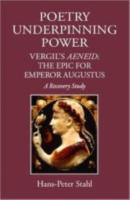
The Classical Press of Wales h/b 488pp £45 (ISBN 9781910589045)
At Aeneid 12. 4-9 Turnus at last returns to the battle ‘like a lion … wounded in the chest by a huntsman’s spear … and rejoices, shaking his long mane, and fearlessly breaks the latro’s tightly embedded missile, and roars with bloody mouth: no differently the inflamed Turnus’ violentia grows.’ Who is the latro? The Harvard school of Virgilian criticism, dedicated to demonstrating that, far from praising Augustus in the person of Aeneas, Virgil sets out to denigrate him, claims that it is Aeneas. Problem: Aeneas has not yet fought Turnus. Well, it must then obviously refer to the time when he will fight and kill him.
It is this sort of Harvardian nonsense that S., emeritus professor of classics at Pittbsurgh, has over many years dedicated himself to attacking. True, latro is an odd way of referring to a huntsman, but the alternative explanation strains sense beyond credibility in the Harvard school’s effort to ‘subvert the epic’s authoritative voice’. As S. does throughout this massively detailed book, he argues the textual case on this point in fine detail, in the context of his fundamental observation: that not only Virgil’s direction of travel, signalled by Jupiter’s promises, the scenes of future Rome in the underworld and e.g. the shield in Book 8, but also his ‘subliminal guidance’ throughout the work, point unfailingly to the Aeneid’s central aim—praise for Augustus as the man who brought Jupiter’s ancient promises to fruition. It is the ‘continuity, coherence and consistency of the Aeneid’s plot-line’ that militate against the Harvard school’s determination to dig out anti-imperialistic voices wherever they can, imposing meaning on the text rather than drawing meaning from it.
S. is equally forthright about the famous final scene where Aeneas contemplates saving Turnus’ life until he sees the baldric which Turnus took from the young Pallas and, furiis accensus et ira, slaughters him. The Harvard school gets very worked up about this clearly outrageous action of one ancient Roman, driven by passionate anger, killing a bitter enemy—surely not the sort of thing any normal Roman would do, and therefore anti-Augustan. But S. points out that Aeneas’ rage is exactly what a just warrior should feel at this stage, quoting the furiae iustae of 8.494 (cf. 10.545), and the ira iusta of 10.714 and merita of 8.501. Likewise, Virgil’s negative picture of Turnus—e.g. his refusal to acknowledge the gods’ will that Aeneas is the true inheritor of Latium (9.133ff.), his realisation that the gods are against him (12.646-49, cf. Jupiter and Juno’s agreement that Turnus must die at 12.796-806) and his treatment of Pallas—all clearly indicate the poet’s ‘direction of travel’. S. devotes over 150 pages to Turnus’ guilt.
Dido too is given thorough treatment (the 67 pages of ch. 5, ‘Allocating Guilt and Innocence’). S. concludes that while Dido merits compassion and pity, Virgil leaves no doubt about her guilt. One might add that the fact that Venus’ decision to make her fall in love with Aeneas leads to her death is neither here nor there. Virgil has read his Homer and knows all about double determination. A further lengthy chapter (over 90 pages) examines Aeneas’ inspection of Rome in book 8, taking him past Rome as it was then with heavy hints about what it would be (ch. 6). S. argues that Aeneas’ bizarre detour to get from the ara maxima to the Palatine was specifically designed to guide Aeneas past all those significant places that every Roman knew were associated with Augustus.
This is an uncompromising assault in which S., furiis accensus et ira, takes no prisoners, either in his text or extensive notes. The guilty men are named and all who show the slightest glimpse of a Harvardian baldric put to the sword. If he gets carried away at times—a long attack on a scholar suggesting that Augustus may not have played any serious role in shaping the epic is quite irrelevant to S.’s central argument—so be it. He is a man on a mission, to have the final word on the Aeneid: if that does not sort them out, nothing will.
He ends with a good question: why have they got it all so hopelessly wrong? His answer is that while Virgil, as all Romans, had no problems with imperialism (the Aeneid was a great favourite of Mussolini’s), the Vietnam-scarred generation took a different view. Academics wished therefore to demonstrate that, under the surface, Virgil shared their misgivings: otherwise, how could one justify asking students to read it? One could argue that such a view was the ultimate trahison des clercs. It is the fact that ancient writers do not dance to our tunes that makes them such necessary reading.
Peter Jones
